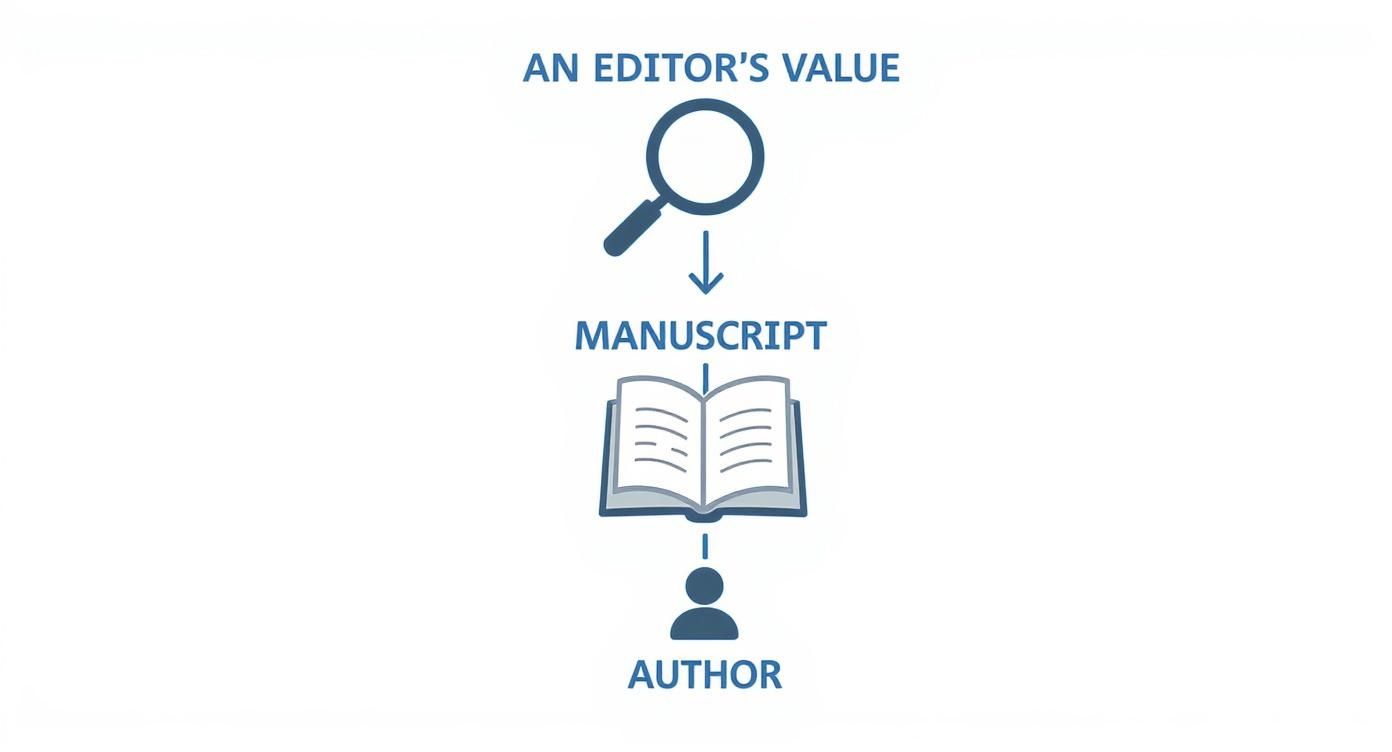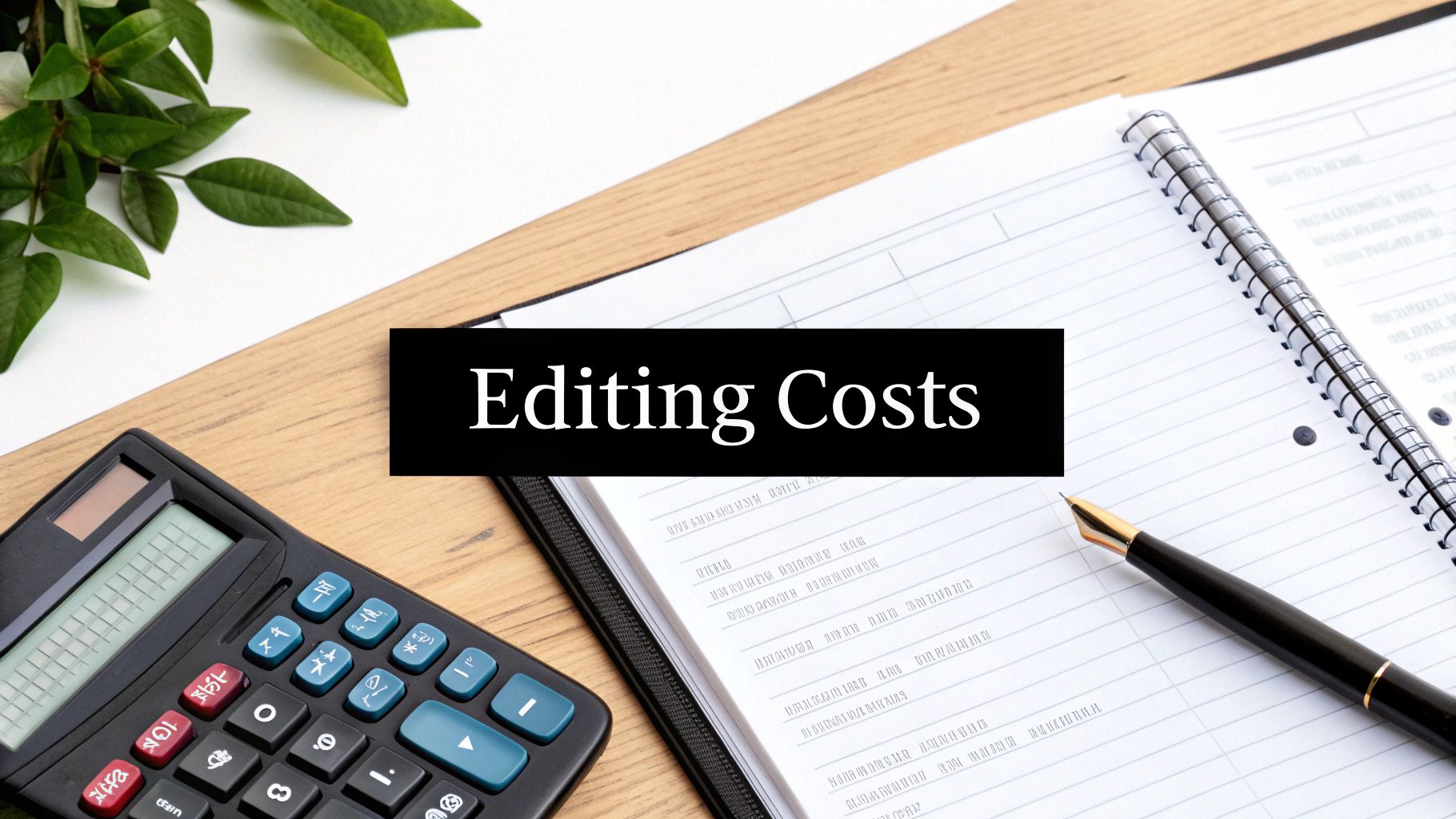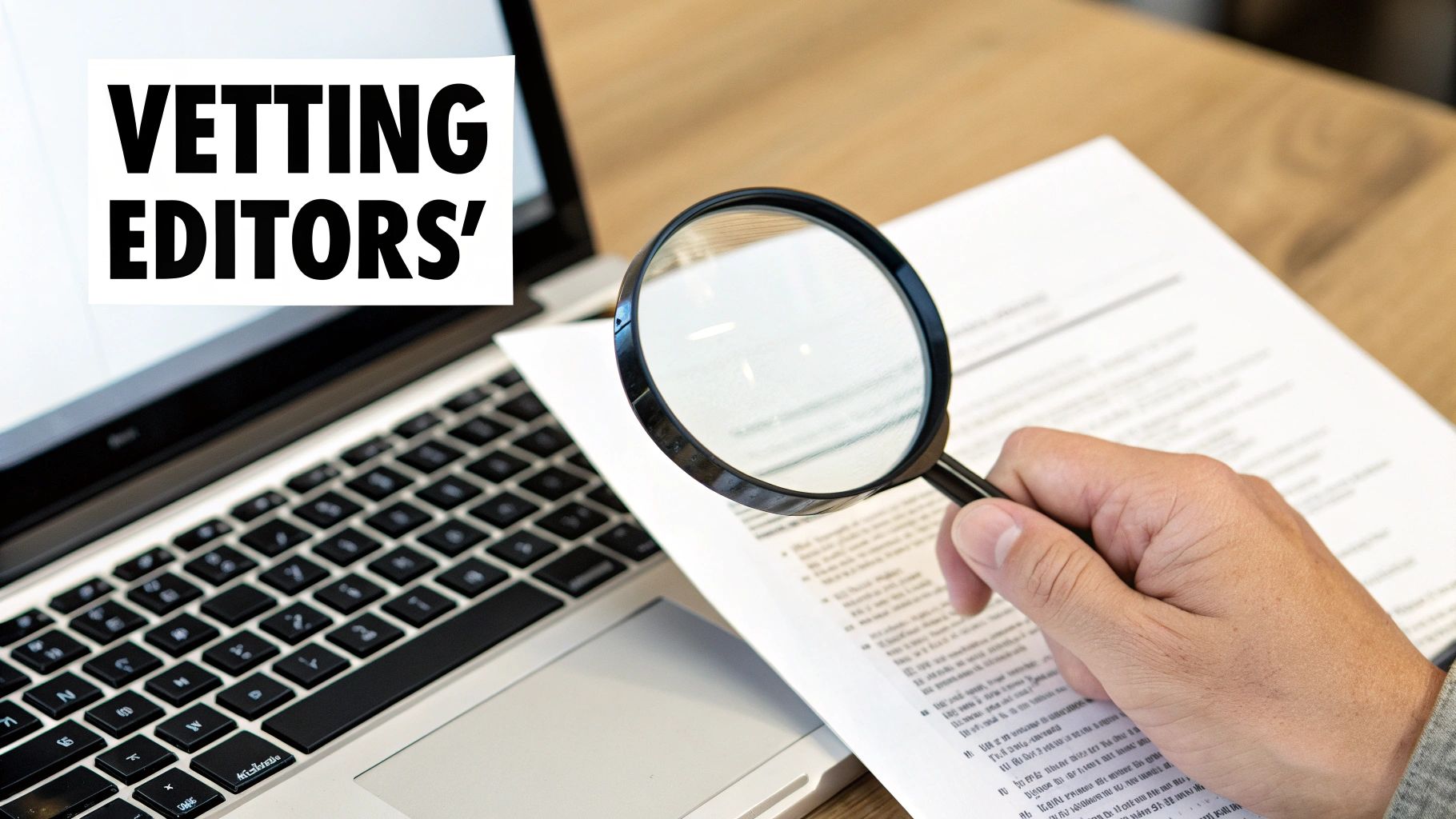Think of a freelance book editor as a personal trainer for your manuscript. They do more than just correct your grammar and fix typos; they spot the weak points, strengthen your narrative core, and really push your story to perform at its absolute best.
Hiring an editor isn’t some final, trivial step. It’s a strategic investment in making your book not just good, but competitive and truly compelling.
Why a Great Editor Is Your Book's Secret Weapon
Every single author, no matter how many books they've written, needs a fresh pair of eyes on their work. It's just a fact. You're too close to the story, too invested in the words you've bled onto the page to catch every plot hole, awkward sentence, or pacing issue.
A freelance book editor brings that crucial distance. They step in as your first real reader, equipped with the expertise to diagnose problems you’ve become blind to.
Their real value, though, goes way beyond catching mistakes. A talented editor elevates your writing. They help refine your unique voice, sharpen your arguments, and make sure your story lands with readers on an emotional level. It's this partnership that turns a decent manuscript into a book people can't put down.
The goal isn't just to get published. It's to create a professional, polished product that racks up positive reviews and builds your reputation. Great storytelling is everything, and an editor is the one who ensures your narrative hits all the right notes. We talk a lot about these principles in our guide on storytelling in marketing, and the same ideas apply here.
The Objective Eye Your Manuscript Needs
An editor’s superpower? Their impartiality. They have zero emotional attachment to that one character you love (but who does nothing for the plot) or that beautifully written paragraph that brings the story to a grinding halt.
Their feedback is honest, direct, and laser-focused on one thing: making the book better. This professional objectivity is exactly what you need to:
- Spot plot inconsistencies that will only confuse and frustrate your readers.
- Strengthen character arcs to make them more believable and resonant.
- Fix pacing and structure to create a page-turning experience.
This kind of focused, professional input is why the editing industry is booming. The global book editing services market is already valued at around $271 million and is set to keep growing. This surge is driven by the explosion of self-publishing and a massive demand for high-quality content.
You can read more about the book editing market growth to get a sense of the trends. It all points to one thing: authors are realizing that a pro editor isn't a luxury—it's essential for success.
Decoding the Different Types of Book Editing
Choosing the right type of editing can feel like trying to order coffee from a menu with a dozen confusing options. You know you need something, but what’s the difference between developmental editing and copyediting? It’s a common hang-up.
Hiring a proofreader when you need a developmental edit is like asking your barista to go roast the coffee beans—you’re talking to the wrong expert for that stage of the process.
Let's make this simple. Think of writing a book as building a house. Each editing stage is a different specialist coming in to make sure the final structure is sound, beautiful, and ready for readers to move into. Getting this right helps you bring on the perfect freelance book editor exactly when you need them.

As you can see, the editor is the crucial link, taking the raw material of a manuscript and shaping it to match the author's vision.
To help you figure out which service you need, here’s a quick breakdown of what each editor does.
Which Editing Service Does Your Manuscript Need?
| Type of Editing | Main Focus | When It's Needed | Example Task |
|---|---|---|---|
| Developmental Editing | Big picture: plot, characters, structure, pacing | After the first draft is complete but before any fine-tuning | Recommending the removal of a subplot that slows down the story's middle |
| Line Editing | Prose, style, flow, voice, and rhythm | After major structural revisions are done | Reworking clunky sentences to improve clarity and impact |
| Copyediting | Grammar, punctuation, spelling, consistency | After the story and style are finalized | Correcting a character's eye color that changes from chapter to chapter |
| Proofreading | Typos, formatting errors, final mistakes | The very last step before publication | Catching a single misspelled word on the final, formatted proofs |
Each stage is distinct, and trying to skip one is usually a recipe for a weaker book. Let’s dive a little deeper into what each of these "construction experts" actually does.
H3: Developmental Editing: The Architect
First up is developmental editing. This is the big-picture, architectural phase. A developmental editor isn't worried about comma placement; they’re looking at the blueprint of your story.
Their job is to make sure the core structure is solid. They'll ask the tough questions:
- Does the plot actually make sense?
- Are the character arcs compelling and believable?
- Is the pacing working, or does the story sag in the middle?
This is often the most intensive stage of editing and can lead to some major revisions. You bring in a developmental editor once you have a complete draft, but way before you start polishing individual sentences.
H3: Line Editing: The Interior Designer
Once the blueprint is solid, it's time for line editing. If developmental editing is the architecture, line editing is the interior design. This editor moves through your manuscript line by line, making sure everything flows beautifully.
They focus on the craft of writing at the sentence level. A line editor helps refine your authorial voice, improves clarity, and makes your prose a joy to read. They’ll tighten awkward phrasing, smooth out clunky sentences, and check for consistent tone. It's all about making your style and substance work together.
A great line editor doesn't change your voice; they amplify it. Their goal is to make your writing sound more like you by clearing away the clutter that gets in the way of its impact.
H3: Copyediting: The Inspector
After the design is set, the copyeditor comes in as the inspector. Copyediting is the nitty-gritty technical review that ensures everything is up to code. This is where the rules of grammar, spelling, punctuation, and syntax are king.
A copyeditor is looking for:
- Consistency: Did a character’s eye color change from blue to green halfway through?
- Accuracy: Are dates, names, and any factual claims correct?
- Grammar: Is every comma, semicolon, and apostrophe exactly where it should be?
They’ll make sure the manuscript follows a specific style guide (like the Chicago Manual of Style), giving you a professional, polished final product.
H3: Proofreading: The Final Polish
Finally, we have proofreading. This is the last check before your book goes to print or gets published. Think of this as the final walkthrough and clean-up, meant to catch any lingering typos, formatting errors, or minor mistakes missed in the earlier stages.
Your proofreader is the last line of defense against those small but embarrassing errors that can pull a reader right out of the world you’ve built.
How Much Do Freelance Book Editors Cost

Alright, let's talk about the big question on every author's mind: what’s this actually going to cost? The honest answer is, there's no single price tag. Hiring a freelance book editor is a lot like commissioning any other highly skilled professional—the costs will shift based on their experience, how complex your book is, and exactly what you need them to do.
To get a handle on your budget, the first step is understanding how editors typically charge. Most will use one of three models, each with its own pros and cons.
- Per-Word Rate: This is the go-to for services like copyediting and proofreading. It's clean and simple, giving you a clear, upfront cost based on your manuscript's length (think $0.02 per word, for example).
- Hourly Rate: You'll see this often for developmental or line editing, where the time involved is harder to predict. An experienced editor can usually give you a solid estimate of the total hours your project will take.
- Per-Project Fee: This is a flat fee for the whole job. It gives you the most predictability and is pretty common for big, comprehensive packages that bundle multiple rounds of feedback.
Key Factors That Influence Editing Rates
The final quote you get from an editor will depend on a few key things. It’s less like buying something off a shelf and more like hiring a specialist for a custom job. The price tag really reflects the unique needs of your manuscript.
The biggest drivers of cost are:
- Editor's Experience: A veteran editor with a shelf full of bestsellers is going to command a higher rate than someone just breaking into the business. Makes sense, right?
- Type of Editing: Developmental editing is the most intensive and, you guessed it, the most expensive. Proofreading, on the other hand, is the least.
- Manuscript Complexity: A dense, technical non-fiction book packed with jargon will cost more to edit than a breezy contemporary romance novel. It just requires a different level of specialized knowledge.
- Turnaround Time: Need it done yesterday? Most editors can make that happen, but expect to pay a rush fee for jumping the queue.
Investing in a quality editor is one of the single most impactful decisions you can make as an author. The cheapest option is almost never the best. A bad edit can do more harm than no edit at all by muddying your voice or introducing new errors.
Understanding Industry Averages
While every project is different, industry data can give you a helpful baseline. You’ll often find hourly rates for freelance book editors landing somewhere between $40 and $65. More specialized tasks like indexing can add another $1,000 to $1,500 for a typical 50,000-word book.
To really dial in your potential costs, you need to do a little math. For a super detailed breakdown of rates, service types, and all the factors that influence the final price, you should check out a practical guide to understanding book editing costs.
You can also use our freelance rate calculator to get a ballpark figure for your project. Getting this financial clarity upfront will help you budget effectively and find a pro who delivers real value for your story.
Vetting Your Editor Beyond the Red Pen

Finding the right freelance book editor isn’t just about hunting for someone who can spot a misplaced comma. Let's be real—technical skill is just the price of entry. That’s the absolute minimum you should expect.
A truly great editor, however, becomes a genuine partner in your creative process. They’re someone who gets your vision and helps you elevate it.
Think of it like hiring a guide for a long expedition. You don't just want someone who can read a map; you need someone who knows the terrain, communicates clearly when things get tough, and actually cares about getting you to your destination.
A top-tier editor brings a mix of technical chops, artistic sensibility, and professional polish to the table. This level of expertise is why skilled editors are in demand, often requiring a degree and years of experience. The Bureau of Labor Statistics puts their median salary around $75,260 annually, which you can read more about here.
Look for Genre-Specific Expertise
One of the biggest things to look for is genre expertise. An editor who lives and breathes hard sci-fi will understand its tropes, reader expectations, and pacing in a way a romance editor just won't. Their feedback will be sharper, more relevant, and infinitely more valuable.
When you’re looking at an editor’s portfolio, don't just see that they've edited "fiction." Dig deeper. Have they worked on historical fiction, epic fantasy, or psychological thrillers like yours? This kind of specialization is what gets you the nuanced feedback that will connect with your target audience.
Communication Is Everything
An editor’s brilliant feedback is useless if it’s delivered poorly. The best freelance book editors are masters of constructive criticism. Their comments should feel encouraging and insightful, not like a teacher’s red-pen rampage that leaves you demoralized.
They take the time to explain why a change is needed, which in turn empowers you to become a better writer.
The goal of a great editor is not to rewrite your book in their voice, but to help you perfect yours. Their feedback should feel like a collaborative conversation, not a list of commands.
Pay close attention to how they communicate in your first few interactions. Are their emails clear and professional? Do they actually listen to your concerns? For more on this, check out our guide on client communication best practices.
Evaluate Their Storytelling Sense
Beyond grammar, a great editor has a deep, almost intuitive grasp of storytelling. They can spot problems with plot structure, character development, and narrative pacing that you’re just too close to the project to see.
This is where a sample edit is worth its weight in gold. When you get it back, don't just scan for corrected typos. Look at the quality of their comments and suggestions.
- Are they asking probing questions about a character's motivation?
- Do they point out spots where the pacing drags or feels rushed?
- Most importantly, do their suggestions feel true to your overall vision for the story?
Finding an editor with this combination of skills is the key. It ensures your manuscript is not only clean and correct but also compelling and unforgettable.
Alright, you’ve figured out what your manuscript needs. Now for the exciting part: finding the perfect creative partner to help bring your vision to life.
This isn't just about ticking boxes on a resume; it's about finding the right person for your specific book. The search can feel overwhelming at first, but knowing where to look is half the battle.
There are a few solid avenues for discovering talented freelance book editors, each with its own vibe. Some platforms are like exclusive clubs, curating the best talent for you, while others are more like a bustling open market where you can find hidden gems.
Where to Find Your Ideal Editor
The best place to start really depends on your budget, your genre, and how much of the legwork you want to do yourself. Here are a few of the top spots to begin your search:
- Curated Marketplaces like Reedsy: These platforms are fantastic because they pre-vet their professionals. You can browse detailed profiles, look through portfolios, and rest easy knowing you're picking from a pool of seasoned editors who really know the publishing industry.
- Professional Organizations: Groups like the Editorial Freelancers Association (EFA) are goldmines. Their member directories let you zero in on specialists by searching by genre, service, and even location to find an editor with the exact expertise your book needs.
- General Freelance Platforms: When it comes to finding and hiring the right freelance book editor, exploring bigger marketplaces is another option. Getting a handle on the differences between popular freelance hiring platforms like Upwork and Fiverr can really shape your approach, but just be ready to do a bit more vetting on your own.
This screenshot from Reedsy shows just how powerful these curated platforms can be. You can filter editors by genre, which is a huge deal. Finding someone with deep experience in your specific niche—whether that’s epic fantasy or historical non-fiction—is a critical first step toward a great partnership.
Your Action Plan for Hiring an Editor
Once you have a shortlist of a few editors who look promising, it’s time to dig a little deeper. A structured approach here will help you make a decision you feel great about and get your project started on the right foot.
A great editor-author relationship is built on clear communication and aligned expectations. Taking the time to properly vet candidates ensures you find a true collaborator who respects your vision and is invested in your book's success.
Follow this checklist, and you’ll navigate the hiring process like a pro:
-
Write a Compelling Project Brief: Think of this as your "job ad." Be super clear about your book's genre, word count, what kind of editing you're after, and your ideal timeline. The more detail you give, the better the proposals you'll get back. This process is pretty similar for other creative roles; our guide on hiring a freelance graphic designer has some great tips on this that apply here, too.
-
Request and Evaluate a Sample Edit: This is a non-negotiable step. Ask your top two or three candidates to edit the exact same 1,000-word sample from your manuscript. You're not just looking for technical skill here—you're getting a feel for their feedback style and whether their storytelling instincts click with yours.
-
Check Their Portfolio and Testimonials: Take a look at the other books they've worked on. Do they line up with your project? Real testimonials from other authors can give you a peek into what it’s actually like to work with them and the kind of results they deliver.
-
Conduct a Brief Interview or Call: Hop on a quick call to chat about their process, communication style, and availability. This is your chance to ask any lingering questions and just see if you have good chemistry. You'll be working closely together, so a good rapport is key.
-
Review the Contract Carefully: Before you make it official, make sure you have a clear agreement that spells everything out: the scope of work, timeline, fees, and payment schedule. This is just good practice and protects both you and your editor.
A Few Questions You Might Have About Hiring an Editor
Stepping into the author-editor relationship for the first time can feel like a big deal. It's a partnership, after all, built on trust, open communication, and the shared mission of making your book amazing.
Let’s tackle some of the most common questions and concerns authors have when they start looking to hire a freelance book editor. Getting these sorted out early makes for a much smoother ride.
Do I Need to Copyright My Book Before Sending It to an Editor?
This is a big one, and completely understandable. The good news? Your work is technically copyrighted the moment you write it down. You don’t need to formally register it with the U.S. Copyright Office before sharing it with a professional.
Think about it this way: any editor worth their salt runs on reputation. Their entire business depends on protecting their clients' ideas and work.
A professional editor’s contract will almost always include a confidentiality or non-disclosure clause. This is your legal protection, giving you peace of mind that your manuscript and big ideas are safe.
To make sure both of you are protected, a solid agreement is non-negotiable. You can get a head start by checking out a freelancer contract template that already includes these crucial clauses.
How Long Does the Book Editing Process Take?
There's no single answer here—the timeline for editing a book can really vary. It all boils down to a few key things:
- The Type of Edit: A deep, comprehensive developmental edit on a 90,000-word novel might take four to eight weeks. A final proofread on that same manuscript? That could be done in just a week or two.
- The Manuscript's Length: Pretty straightforward—longer books just take more time to get through.
- The Editor's Schedule: Good editors are often booked months in advance, so their availability is a huge factor.
Any professional editor will give you a clear, realistic timeline in their proposal. Make sure you both agree on all the deadlines before any work kicks off.
What if I Disagree With My Editor's Suggestions?
It’s your book. You always have the final say. A little constructive disagreement is actually a normal—and healthy—part of the process. A great author-editor dynamic is a collaboration, not a dictatorship.
If a suggestion just doesn't sit right with your story or voice, don't just toss it aside. Ask your editor why they made it. Hearing their reasoning might uncover an underlying problem you hadn't seen, even if you end up fixing it a different way. You don't have to accept every single change, but you're paying for their expertise, so it's smart to weigh their feedback carefully.
Can I Hire One Editor for All Types of Editing?
While some editors are multi-talented and offer a range of services, it's usually better to bring in specialists for different stages. The skills needed for big-picture developmental editing are worlds apart from the detail-obsessed, rule-based focus of a copyeditor or proofreader.
Plus, getting a fresh set of eyes for the final stages is a classic industry best practice. Once you've reworked your manuscript based on a developmental edit, having someone new come in for the copyedit helps catch any lingering mistakes or inconsistencies. This layered approach is your best bet for a truly polished book.
Ready to find the perfect creative professional for your project? Creativize connects you with talented local experts who can bring your vision to life. Find your match today!

